| Srl | Item |
| 1 |
ID:
144312
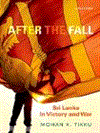

|
|
|
|
|
| Publication |
New Delhi, Oxford University Press, 2016.
|
| Description |
xix, 308p.hbk
|
| Standard Number |
9780199463503
|
|
|
|
|
|
|
|
|
|
|
|
Copies: C:1/I:0,R:0,Q:0
Circulation
| Accession# | Call# | Current Location | Status | Policy | Location |
| 058622 | 954.93032/TIK 058622 | Main | Withdrawn | General | |
|
|
|
|
| 2 |
ID:
095638
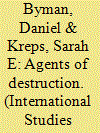

|
|
|
|
|
| Publication |
2010.
|
| Summary/Abstract |
This article evaluates state-sponsored terrorism as a principal-agent issue. More often applied to the study of licit national or international institutions as a way to improve their governance, we argue that applying principal-agent analysis to illicit relationships such as those between states and terrorist agents is an equally fruitful application, though one with different objectives. Rather than being used as a tool to improve governance, applying principal-agent analysis to illicit relationships such as state-sponsored terrorism may point to areas of susceptibility and thus inform more effective counterterrorism strategies. In this article, we explain why states delegate to terrorist groups, how they seek to control their agents, and the tensions in the relationship, both generally and through specific reference to Iran's sponsorship of Hizballah, Syria of various Palestinian groups, and the Taliban of al-Qa'ida. This analysis yields propositions about the conditions under which states are likely to delegate to terrorist groups and specific recommendations on how principal-agent problems of these illicit relationships may be used in practice to combat terrorism.
|
|
|
|
|
|
|
|
|
|
|
|
|
|
|
|
| 3 |
ID:
108742
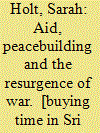

|
|
|
|
|
| Publication |
Hampshire, Palgrave Macmillan, 2011.
|
| Description |
xviii, 222p.
|
| Standard Number |
9780230240278
|
|
|
|
|
|
|
|
|
|
|
|
Copies: C:1/I:0,R:0,Q:0
Circulation
| Accession# | Call# | Current Location | Status | Policy | Location |
| 056386 | 954.9303/HOL 056386 | Main | On Shelf | General | |
|
|
|
|
| 4 |
ID:
107419
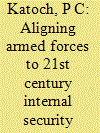

|
|
|
| 5 |
ID:
061610
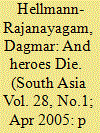

|
|
|
| 6 |
ID:
139351
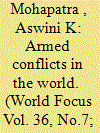

|
|
|
|
|
| Summary/Abstract |
To sum up, what accounts for the rising incidence of internal armed conflicts in plural societies is the interplay of variety of factors ranging from the nature of the polity (i.e. liberal/transitional democratic or autocratic), stage of economic development, level of integration and state-society engagement to the process of state formation and national identity construction.
|
|
|
|
|
|
|
|
|
|
|
|
|
|
|
|
| 7 |
ID:
020174
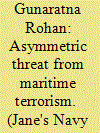

|
|
|
|
|
| Publication |
Oct 2001.
|
| Description |
24-29
|
|
|
|
|
|
|
|
|
|
|
|
|
|
|
|
| 8 |
ID:
067636
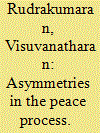

|
|
|
| 9 |
ID:
095768
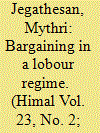

|
|
|
| 10 |
ID:
121894
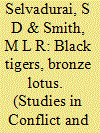

|
|
|
|
|
| Publication |
2013.
|
| Summary/Abstract |
Although much has been written on the Sri Lankan state's civil war with the Liberation Tigers of Tamil Eelam (LTTE), less has been said about how the conflict's dynamics evolved. How did the parties come to utilize the methods they did? Why did the war become so brutal, characterized by a predisposition toward extreme violence on both sides? Using the typology of "dirty war," this investigation seeks to address such questions, demonstrating how the strategic choices of the main belligerents shaped the conflict. The analysis shows that while the conflict emerged out of deep-rooted social and ethnic divisions, these factors do not account for how the war came to be defined so comprehensively by the methods of dirty war. It finds that dirty war developed from a sporadic tactic to advance political goals to dominant military practice by a reciprocal process of escalation that eventually internalized dirty war as the accepted mode of strategic communication.
|
|
|
|
|
|
|
|
|
|
|
|
|
|
|
|
| 11 |
ID:
127681
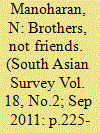

|
|
|
|
|
| Publication |
2011.
|
| Summary/Abstract |
Mahatma Gandhi referred to Sri Lanka as India's 'daughter state'. True to this metaphoric observation, relations between the two countries have been by-and-large cordial, but occasionally not devoid of irritants. India is Sri Lanka's closest, most important and powerful neighbour. Relations between the two neighbours stretch to more than two millennia in wide-ranging areas-political, economic, socio-cultural and military. Common colonial experience under Britain led both countries to have similar world views, yet certain strategic imperatives and national interests dictated differing policies, at times conflicting with each other. India has always stood by Sri Lanka and time-and-again reiterated its unambiguous support to safeguarding the latter's unity, territorial integrity and sovereignty. Despite witnessing various ups and downs, the bilateral ties between the two countries have never been bad to a level of confrontation. They have in fact matured over a period of time and, in the present context, serve as a model of good neighbourly interaction.
|
|
|
|
|
|
|
|
|
|
|
|
|
|
|
|
| 12 |
ID:
083051


|
|
|
|
|
| Publication |
2008.
|
| Summary/Abstract |
The present paper explores the importance of new burial practices within the process of nation-building in the Sri Lankan territories controlled by the Liberation Tigers of Tamil Eelam (LTTE). In particular, the paper focuses on the perception that Tamil people, both civilians and fighters, seem to have of the Tigers' cemeteries as symbolic centres of Tamil Eelam, the new separate state claimed by the LTTE. This article analyses the reasons that have led to this perception. On the one hand, it discusses the functional analogies between the LTTE cemeteries and the war graveyards belonging to military western traditions. On the other hand, it emphasizes the peculiarity of the LTTE cemeteries of being perceived as holy places. The Tigers' cemeteries are called Tuilum Illam, literally in Tamil 'Sleeping Houses', and are often described as temples. The paper offers an explanation why the LTTE, in spite of their asserted secular nature, have decided not to reject this religious interpretation; namely, because it allows them to include the Tuilum Illam in the mainstream of Hindu tradition. In this context, the ability to integrate the religious dimension represents a crucial component in the process of nation-building. This article draws upon the findings of fieldwork carried out since July 2002, especially in the northeastern regions of Sri Lanka controlled by the LTTE.
|
|
|
|
|
|
|
|
|
|
|
|
|
|
|
|
| 13 |
ID:
055201
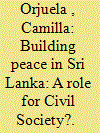

|
|
|
| 14 |
ID:
074910
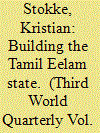

|
|
|
|
|
| Publication |
2006.
|
| Summary/Abstract |
Sri Lanka's civil war has created a political – territorial division between the government of Sri Lanka and the Liberation Tigers of Tamil Eelam (ltte), where ltte is engaged in a process of state building within the areas they control. The article examines this state formation with an emphasis on the functions and forms of governance that are embedded in the new state institutions. It is observed that the emerging state formation has a strong focus on external and internal security, with an additional emphasis on social welfare and economic development. In terms of governance, the ltte state apparatus is marked by authoritarian centralisation with few formal mechanisms for democratic representation, but there are also partnership arrangements and institutional experiments that may foster more democratic forms of representation and governance. Hence, resolving the security problem in tandem with political transformations towards democratic governance remain prime challenges for peace building in northeast Sri Lanka.
|
|
|
|
|
|
|
|
|
|
|
|
|
|
|
|
| 15 |
ID:
087306
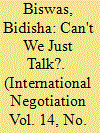

|
|
|
|
|
| Publication |
2009.
|
| Summary/Abstract |
The international community has been increasingly interested in the ways by which external actors help end civil conflicts. This study compares and contrasts the conflicts in Sri Lanka and Indonesia (Aceh) in order to understand why international intervention has failed in Sri Lanka but has been successful in Aceh. In Sri Lanka, the intensely fractured nature of domestic politics has been one of the most significant obstacles to successful peace talks. Although international intervention has become necessary to overcome the trust barriers between the two parties, it is seen as a threat to national sovereignty and therefore rejected. In contrast, the democratization process in Indonesia created new opportunities for peace. The political will of principal actors and their receptivity to external assistance enabled a peace agreement in 2005. The findings of this study show that both domestic political consensus and a supportive international environment, which protect the reputational concerns of the negotiating state, are necessary for resolving protracted ethnonational conflicts.
|
|
|
|
|
|
|
|
|
|
|
|
|
|
|
|
| 16 |
ID:
022263
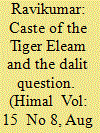

|
|
|
|
|
| Publication |
Aug 2002.
|
| Description |
11-15
|
|
|
|
|
|
|
|
|
|
|
|
|
|
|
|
| 17 |
ID:
093339
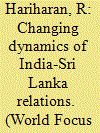

|
|
|
|
|
| Publication |
2009.
|
| Summary/Abstract |
The defeat of the Liberation Tigers of Tamil Eelam (LTTE) and the elimination its founder-leader velupillai Prabhakaran along with the entire leadership in May 2009 brought the curtains down on Tamil insurgency in Sri Lanka, at least for the time being.
|
|
|
|
|
|
|
|
|
|
|
|
|
|
|
|
| 18 |
ID:
056552
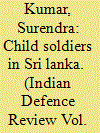

|
|
|
| 19 |
ID:
125973
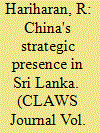

|
|
|
| 20 |
ID:
103085
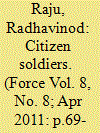

|
|
|